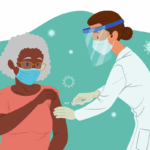As we age, our nutritional needs change, but the importance of eating well only grows. A balanced diet can help older adults maintain energy, support immune function, preserve muscle mass and reduce the risk of chronic diseases like heart disease, diabetes and osteoporosis. Read on to see how best to eat well as you age.
Focus on Nutrient Density
Older adults often need fewer calories but more nutrients. That means every bite counts. Choose foods rich in vitamins, minerals, fiber and protein. Key nutrients to prioritize include:
- Calcium and Vitamin D: Crucial for bone health. Found in dairy, fortified plant-based milks, leafy greens and fatty fish.
- Vitamin B12: Absorption decreases with age. Include fortified cereals, eggs, dairy and seafood.
- Potassium: Helps manage blood pressure. Found in bananas, sweet potatoes, beans and spinach.
- Fiber: Supports digestion and heart health. Whole grains, fruits, vegetables and legumes are excellent sources.
Protein for Strength
Maintaining muscle mass is essential for mobility and independence. Include lean meats, fish, eggs, beans, lentils and dairy in your meals. Greek yogurt and canned salmon are convenient, protein-rich options.
Hydration Matters
Older adults may lose their sense of thirst, making dehydration a hidden risk. Drink water regularly, and include hydrating foods like fruits, soups and smoothies. Limit sugary drinks and alcohol.
Smart Food Choices
Minimize added sugars, saturated fats and sodium. Instead, flavor meals with herbs and spices. Choose whole foods over processed ones, and opt for healthy fats like those in avocados, nuts and olive oil.
Superfoods for Aging Well
Incorporating nutrient-dense “superfoods” can offer extra health benefits:
- 🥗 Leafy greens (like kale and spinach) support eye and bone health.
- 🥦 Cruciferous vegetables (broccoli, cabbage) offer fiber and cancer-fighting compounds.
- 🫐 Blueberries boost brain function and reduce inflammation.
- 🌻 Nuts and seeds provide heart-healthy fats and antioxidants.
Make Mealtimes Enjoyable
Eating with others can improve appetite and mood. Join community meals, invite friends or try potlucks. If cooking is a challenge, choose frozen or pre-cut produce and simple recipes.
Talk to Your Doctor
Some medications affect nutrient absorption. Ask your healthcare provider if you need supplements, especially for vitamin D or B12.
Eating well isn’t just about living longer; it’s about living better. With thoughtful choices, older adults can enjoy meals that nourish both body and spirit.














